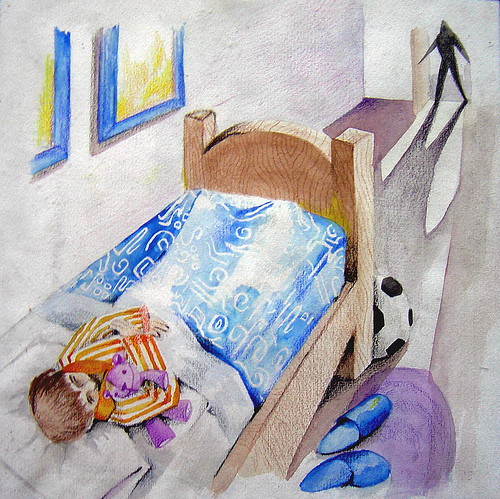
by Jane Chitty

It can be very distressing, both for the child and the parents, when nightmares or night terrors become a regular occurrence. But there is a difference between night terrors and nightmares. Children can have both at different times in their young lives.
The average age for night terrors is between 3 and 12 years – with a bit of leeway at either end. In contrast, nightmares may occur for all of us from time to time, and sometimes children have a particular period of time when certain fearful nightmares keep recurring.
Night Terror vs. Nightmares
Probably the main difference is that night terrors scare the parents while nightmares scare their children. This is because when children have a night terror, they are still in a deep stage of sleep. They may look like they are awake as they scream out or thrash about but they are not awake. They will usually refuse any offer of help and won’t recognize parents or caregivers.
The fact that the body remains active and the child seems awake and in deep distress fools many parents into thinking they can help talk the child down from a night terror. This is ineffective, since the child won’t hear you and any attempts to fully wake the child may create additional distress.
If children do wake during a night terror (which may last for a minute or as long as an hour) you can be thankful that they will not remember anything of the event. They usually won’t require comfort and may simply seem confused and wonder why you are standing over them in the middle of the night.
In most cases it is much better not to try to wake children with night terrors, but simply make sure they are safe and secure in their sleeping space, restrain them gently as needed during a night terror, and let them eventually fall back to sleep.
On the other hand, nightmares are the scary dreams that frighten children and many will remember their nightmares and tell you about them if they wake up. Nightmares occur during the RED (or rapid eye movement) stage of sleep so your child is more likely to wake up when a nightmare is in progress. So if a child comes running to your bed in the middle of the night, obviously frightened, then he or she is in need of some love and cuddles. Very different from a night terror.
Causes and Remedies
So once you have established which form of nocturnal disturbance you child is having, what should you do about it?
Night terrors can be caused by poor quality sleep, extreme stress, a fever, medication or even an immature central nervous system. Nightmares often have similar causes – stress, traumatic events, some medications and various illnesses when accompanied by a fever.
Here are some home remedies that other parents have found to be helpful to prevent both night terrors and nightmares in the first place. You may find one or two solutions that work for you and your child too.
1. Guided Meditation at Bedtime
Take your child on a guided meditation at bedtime for its calming effect. Ask them to pack up any worries or concerns into a garbage bag (imaginary or real), tie it up and take it to a place of their choice (either in the imagination or a real place).
Once they reach their place of choice, they give the bag to someone they meet on their way and it is gone before retracing their steps back to bed.
2. Dream Catcher Above the Bed
Some children enjoy and find comfort from having a dream catcher hanging above their bed.
3. Lavendar or Lemon Balm Under the Pillow
Add a drop or two of lavendar oil (Lavendula angustifolia), lemon balm (Melissa officinalis) and Hops (Humulus lupulus) on your child’s pillow at night. These essential oils have calming properties.
4. Offer Healthy Snack Before Bed
One suggestion is that children may have a precipitous blood sugar drop during sleep. In which case, it is recommended that you give your child a healthy snack just before bed.
5. Essential Oil for Deep Sleep
Bach Flower remedies is another method to help prevent night terrors and nightmares. Other suggestions include FES St. John’s Wort as a flower essence, Chaparral or a blend called Kindergarten (available at most health food stores or Whole Foods) which is specifically formulated for children. These oil blends nourish them through the experience of childhood, physically, emotionally and spiritually.
Serenity, an essential oil blend, can be massaged to the feet every night before bed. Others find an homeopathic remedy will help. You just need to read the instructions to make sure that any natural product you choose is suitable for your child’s age group.
7. Play Soft Classical Music at Night
Try keeping a fan going in the bedroom for white noise or play soft classical music. Sometimes just the need to go to the bathroom manifests as nightmares or night terrors. Playing classical music or white noise in background will help the child relax.
8. Make Sure Child is Comfortable
In the cold weather, heavy blankets are suggested for providing a comforting hug sensation for children. In warmer months, sew heavier squares of fabric to the corners of a lighter blanket for the same sensation without your child becoming too hot.
9. Read Calming Bedtime Stories
The TV could well be a problem as many children can end up with nightmares from watching something even if it appears innocent enough to you. Instead, read calming children’s books at bedtime.
10. Eliminate Processed Food and Artificial Colorings from Diet
Diet can be very important. Especially avoid all processed foods. Some children can be affected by gluten (or even casein – from dairy). Night terrors may well be caused by a lack of niacin. If so, then you can give a niacin supplement to your child. Try eliminating all sugars (apart from naturally occurring sugar in honey and fruit). Many children have been found to be allergic to artificial colorings which cause bad nighttime experiences as a result.
These are great home remedies that will help your child sleep better without nighmares. It is a good idea to experiment with various solutions and find out which one works best for your child.
(Jane Chitty writes regularly for Healing Natural Oils, a producer and retailer of high-quality, all-natural treatments for a variety of conditions (including acne, arthritis, moles, warts skin tags and many more) using specially formulated essential oil blends. Jane lives in Cape Town, South Africa but is able to spend some time in both the USA and the UK because of close family living there. She loves to compare natural treatments and lifestyles – especially in the areas of health, green living and nutrition – in these three very different countries. Her daily posts can be found at www.amoils.com/health-blog.)



